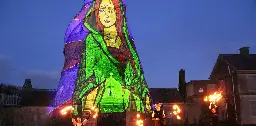Brigid’s Day: how a festival of fire and fertility connects Christian Ireland with its pagan past
Brigid’s Day: how a festival of fire and fertility connects Christian Ireland with its pagan past
The traditional start of spring in Ireland on February 1 is now marked with celebrations of women, empowerment, food, sustainability and craft.

Brigid’s Day is the first traditional festival of the calendar year in Ireland and has been for centuries. However, it was only in 2023 that the government officially recognised Brigid’s Day as an official holiday.
The Celtic year was traditionally broken up by four festivals, known as the quarter days: Imbolg, Bealtaine, Lughnasa and Samhain. Imbolg (also spelled Imbolc) is celebrated on February 1 and signals the beginning of the Celtic season of light, a time for renewal and essentially a new year.
Many of the rituals associated with Imbolg (and the other quarter days) actually begin on the eve of the festival because, in Celtic belief, days begin at sunset as opposed to sunrise. Imbolg is a festival that has strong associations with Brigit (the early Celtic goddess) and Brigid (the later saint) and is associated with ideas of renewal, light, fertility, fire, food production.